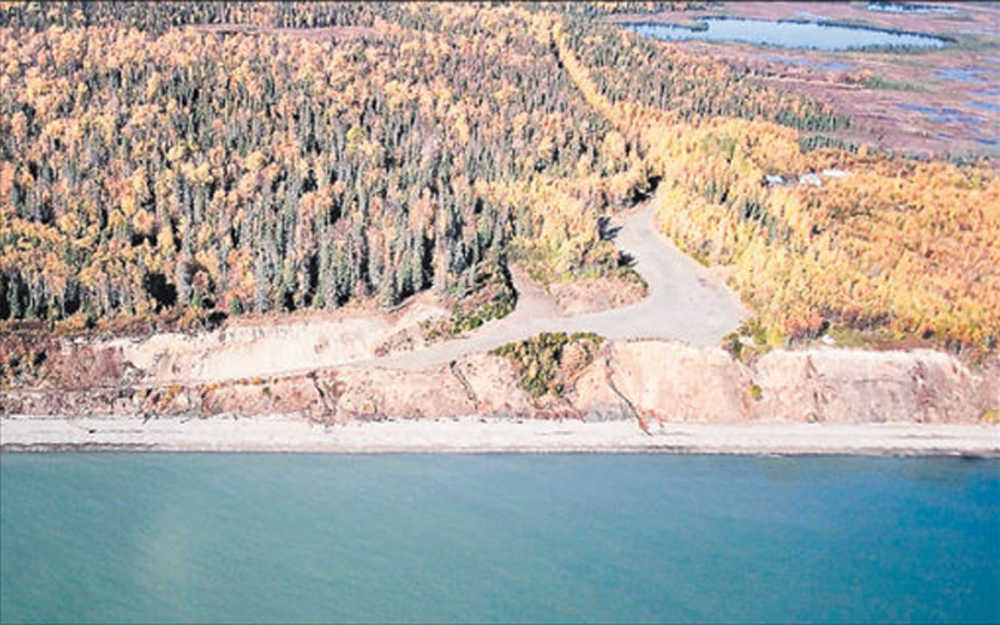A small creek is causing big trouble for Chuitna mine developers and the Alaska Department of Natural Resources.
The Alaska Department of Natural Resources, or DNR, heard arguments from Chuitna Citizens Coalition, Cook Inletkeeper, the Alaska Center for the Environment, and PacRim Coal in the latest installment of a lengthy and contentious permitting process for a proposed coalmine in the Chuitna River drainage.
The hearing centered not as much around the well-established pro-mining and pro-salmon arguments as a regulatory question. Representatives presented arguments for whether or not DNR should grant water rights to Chuitna Citizens Coalition, with which the Chuitna organization could potentially halt PacRim’s ongoing regulatory permitting process.
“The big issue for us is the policy issue, whether DNR to allow private citizens to take part in the permitting process,” said Eric Fjelstad, an attorney representing PacRim. “We think that answer should clearly be no.”
PacRim’s proposal has seen intense criticism from Alaskans, who have collectively sent over 7,500 letters of public comment to the Department of Natural Resources opposing the mine and supporting the establishment of water rights aimed at salmon habitat preservation.
The mine would require PacRim to dewater 20 square miles of salmon spawning grounds to dig a strip mine for low sulphur coal.
Chuitna Citizens Coalition, Cook Inletkeeper, and the Alaska Center for the Environment have filed for instream flow reservations, or IFRs, which would grant a measure of regulatory authority for one of the Chuitna River tributaries, Middle Creek. PacRim cannot build the mine without draining this stream.
PacRim objects roundly to Chuitna Citizens Coalition’s IFR. IFRs are typically reserved for state and local governments, rather than private citizens or coalitions, though certain isolated cases exist giving IFRs to non-governmental organizations, according to Trustees for Alaska legal director Valerie Brown.
PacRim and others argued that the unintended consequences of awarding IFRs to private citizens sets a dangerous precedent for investment and development in Alaska.
“There is no need (for privatizing IFRs) when you have the kind of permitting process you have here,” Fjelstad said. “The resources that you have here will be squarely addressed by the permitting process. This is the big issue. It’s the reason trade groups are here. They care about the integrity of the process.”
Indeed, several representatives from oil, gas, and mining industries with no vested interest in the Chuitna Coal Project, including the Alaska Oil and Gas Association and the Alaska Miners Association, also voiced fear that granting Chuitna Citizens Coalition an IFR would have negative impacts on the industry.
“It makes very little sense for water flow decisions to be made outside the regulatory framework of the permitting process,” Alaska Miners Association executive director Deantha Crockett. “Alaskans rely on the permitting process. Chuitna is no exception.”
The permitting process itself, mine proponents said, already takes into account the best public interest and conservation issues that concern Chuitna Citizens Coalition and others. DNR will always have those factors to consider, and snagging the process won’t help, they said.
“There’s no upside to Alaska making this decision now,” said Josh McAndrew, counsel for the Alaska Oil and Gas Association. “If you want to make a decision (to halt permitting) later, fine. Wait until you have all the information after the tried and true permitting process.”
Alaska Mental Health Trust, the landowner for the bulk of the proposed mine, is entitled to a percentage mineral rights through a state trust, and argued against DNR granting IFRs because it would hinder the public interest.
“The Alaska trust is the predominant land owner in the Chuitna River drainage,” said John Morrison from the Alaska Mental Health Trust. “The revenue anticipated from this project alone with effectively double our historic revenue from trust lands. The granting of an IFR would be the end of this project. The state has a fiduciary duty to trust land.”
Brown argued that the IFRs would be in harmony with the Water Use Act, that the three private organizations have followed each requirement for filing, and that the fears of the mining industry are overblown.
“This doesn’t turn (Chuitna Citizens Coalition) into some jackbooted regulator,” said Brown. You have limited ability to do much. This does not prevent the administrative process. It won’t change the proceedings. We have a right to the adjudication.”
Bob Shavelson, executive director of the Chuitna Citizens Coalition, disagreed that DNR’s choice amounted to a regulatory procedure, and that the matter at hand is, and can only be, about the health of the salmon.
“This isn’t about the regulatory issue,” Shavelson said. “It’s about the fish… I’ve heard time and again that fish and mining can coexist. I’m sure there was a lot of money behind that at PacRim’s office. You can’t have it both ways. You’re either going to mine, or you’re going to fish, you can’t have both.”
DNR has a tentative date of Oct. 9 scheduled for the IFR decision.
DJ Summers can be reached at daniel.summers@alaskajournal.com

